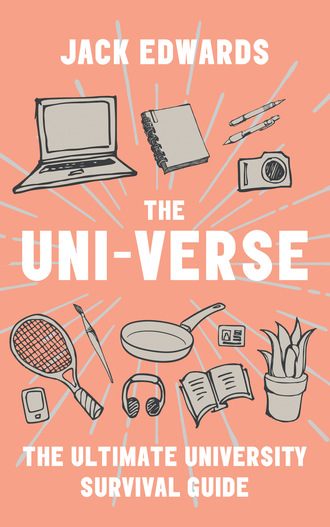
The Ultimate University Survival Guide
Before you do that, however, allow yourself to feel the pain – and really feel it. Experience it. Understand it. Don’t blame yourself for being susceptible to human emotions, and give yourself time to come to terms with it. Rejection can feel like a loss in some ways, because it’s a specific door closing, and probably one you’d hoped would be held open for you. Just think of the phrases we use to describe rejection: a kick in the teeth; a slap in the face; a serious blow; a punch in the gut. All these idioms and platitudes liken the sensation of rejection to physical pain, because that is how humans respond to it. It’s normal, and it’s okay.
In fact, Guy Winch’s book Emotional First Aid reports that rejection is such a strong emotion that the body registers the sensation as if it were physical pain. Brain scans have revealed that the two sensations even manifest themselves in identical regions of the brain, and so rejection rears its ugly head in both a visceral and physical way. In a ball-tossing experiment depicted in Winch’s study, three strangers in a waiting room start throwing a ball among themselves, until one is deliberately excluded from the game by the other players, who were really just (evil) scientists in disguise. The person who found themselves in an unwitting game of piggy-in-the-middle reported feeling deep pain at the moment of recognition that they had been rejected by the others. Those given Tylenol (a pain-relief drug) experienced this feeling to a lesser extent, and yet the drug was ineffective at relieving other emotions like embarrassment. Rejection is like a physical pain, and if there are people in lab coats backing up that claim then I’m not here to question it.
The point is this: rejection appears to be the most ostensible manifestation of failure in our lives, and it really doesn’t discriminate. No one gets a get-out-of-jail-free card, and yet there’s no way of preparing for it or softening the blow. But rejection isn’t the end of the road, and it’s certainly not one big epic fail. Rejection is redirection, and a route to different opportunities. It’s a chance to have a fresh start, to re-evaluate and come back stronger. Learn from it, take it on the chin and improve. Know more next time.
Also, don’t take rejection too personally. Remember that what one person perceives as your ‘weakness’, another person will deem to be your greatest strength. When Anna Wintour was fired from a magazine job because the editor at the time thought her shoots were too edgy, that editor didn’t know that she’d later be crossing her fingers for Wintour, now editor-in-chief of American Vogue, to bless her with a Met Gala invite. When Oprah Winfrey was fired from a Baltimore broadcaster for being too empathetic and emotionally involved with her interviewees, she didn’t know that this perceived ‘weakness’ would later make her a billionaire. When U2 were declined by RSO Records, they never would’ve believed they could go on to sell 170 million records worldwide, or have the heaviest mantelpiece ever, since it’s decorated with 22 Grammys.
For most of us, minor rejections probably won’t lead to 14 studio albums, but that’s beside the point. The true tragedy would be to give up trying, or to crumble entirely and let the rejection overwhelm us or make us settle for less. Being rejected from my ‘dream’ university led me down a different path, to a different university and a different experience. To a place which has allowed me to thrive. To a university I now adore. In fact, this book wouldn’t exist without that rejection, and I can honestly say that if Doctor Who appeared in the TARDIS right now with the offer to go back in time and change it all, I’d let time play out in exactly the way it did. Because I’m better for it. Because I needed rejection to be where I am now. (Although I would still take up the opportunity to have a ride in the TARDIS and maybe give Henry VIII’s wives the heads-up.*)
Rejection will happen in our lives, and that’s okay. In fact, in a weird, twisted, messed-up kind of way, it’s necessary.
That said, in the context of applying to university (that’s what this book is all about, after all), don’t let fear of rejection stop you from applying to the places you dream of. They may feel unattainable or impossible, but if you never try, you’ll never know. It’s important to remember that there are always options, be it Clearing,† Adjustment,‡ a gap year or second choices, so you’ll be all right. Keep pushing and remember who you are. You’ll thank yourself in six months’ time.
Now you’ve accepted and embraced it, it’s time to dust yourself off, reset and come back stronger. Time to prove ’em wrong and become one of those success stories we spoke about earlier.
* Giving Henry VIII’s wives the heads-up is probably the most insensitive use of the English language ever, since two of them were literally beheaded. Sorry about that, Anne and Cath.
† Clearing is the process by which you can still go to university, even if you didn’t meet the offer your firm-choice university gave you.
‡ Adjustment is essentially the opposite of Clearing: when you do better than you expected to, and move to a university with higher entry requirements.
Конец ознакомительного фрагмента.
Текст предоставлен ООО «ЛитРес».
Прочитайте эту книгу целиком, купив полную легальную версию на ЛитРес.
Безопасно оплатить книгу можно банковской картой Visa, MasterCard, Maestro, со счета мобильного телефона, с платежного терминала, в салоне МТС или Связной, через PayPal, WebMoney, Яндекс.Деньги, QIWI Кошелек, бонусными картами или другим удобным Вам способом.

